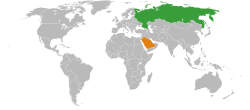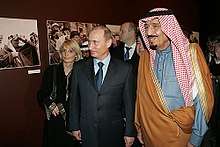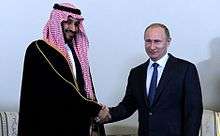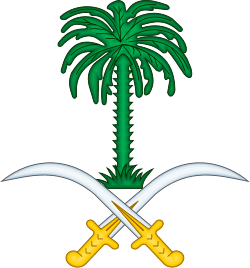Russia–Saudi Arabia relations
 | |
Russia |
Saudi Arabia |
|---|---|
Russia–Saudi Arabia relations (Russian: Российско-саудовские отношения) (Arabic: العلاقات السعودية الروسية) is the bilateral relationship between Russia and the Kingdom of Saudi Arabia. The two countries are referred to as the two petroleum superpowers and account for about a quarter of the world's crude oil production between them.
Saudi Arabia and the Soviet Union
The first country to establish full diplomatic relations with the Kingdom of Hejaz and Nejd (the name of the Saudi state until 1932) was the Soviet Union.[1][2] The relations began in 1926[3] as a means for Moscow to stand up to Britain. The first Consul General was Karim Khakimov, a Soviet Muslim of Tatar descent sometimes called the Soviet Lawrence of Arabia, who in February 1926 drove through gunfire from Jeddah to Ibn Saud's residence in the desert to hand over a formal note recognising his status as king. Relations improved further when in June 1926 the Pan-Islamic Congress of Mecca was called to resolve the dispute over control of the holy sites of Mecca and Medina. The Soviet Union, with its 30 million Soviet Muslims, supported Ibn Saud by sending six Soviet Islamic scholars to take part in the congress, contrary to its atheistic ideology. Using the Soviet influence to spread Communist propaganda among Hajj pilgrims was unsuccessful so the diplomatic focus turned to the creation of trade links between Soviet Black Sea ports and Hejaz. Ibn Saud's son Prince Faisal (who became king in 1964) visited the Soviet Union in 1932 during his extensive European trip. King Abdulaziz used Moscow's offer of one million British pounds in financial aid as leverage with London and never accepted the USSR's offer.[4]
However, relations cooled later on; in 1932, the Soviet Muslims were unofficially banned from performing Hajj. Khakimov returned to Jeddah as the Head of Mission in 1935, and tried to renew the relationship, but Moscow was no longer interested in new trade contracts. Stalin, who was never convinced of the value of the USSR's presence in the Gulf, saw the partnership with King Abdulaziz and political ambitions for the Gulf as disposable political gambits that Moscow thought would enhance relations with England, whose support the Soviet Union sought against Hitler. Khakimov was recalled to Moscow for a routine visit in 1937 and arrested on suspicion of being a spy; he and his colleague Turyakulov fell victim to Stalin's political terror. Turyakulov was executed in October 1937 and Khakimov the following January.[4] King Abdulaziz was outraged at the killing of these two Soviet diplomats whom he considered his friends. Two months after Khakimov's execution American geologists discovered the world's largest deposits of crude oil in Dhahran prompting the Soviet Union to appoint a new head of mission in Jeddah in 1938. King Abdulaziz refused to accept anyone other than Khakimov or Turyakulov and months later broke diplomatic ties with the Soviet Union, accusing Moscow of inciting a revolution in the Muslim world. With the USSR out of the way, Britain and latterly the US, took over the development and exploitation of Saudi oil.[4]
Relations were especially strained from 1979, during the Soviet–Afghan War, with Saudi Arabia supporting the Afghan jihadis in close cooperation with the United States.
Diplomatic relations were only reestablished in 1992, after the dissolution of the Soviet Union and the establishment of the Russian Federation.[4][5] Despite a lack of relations, about 20 Soviet Muslims were allowed to annually make the Hajj from 1946 until 1990 when liberalization allowed thousands of Soviet Muslims to attend.[6] In the 25 years since, Russian-Saudi relations have never developed beyond symbolic visits though in 2017 Saudi King Salman visited Moscow with a 1,500-strong delegation; however, the Moscow-Riyadh agreement paled in comparison to Saudi arms contracts with the US.[4]
Saudi Arabia and Russia

Russian President Vladimir Putin met King Abdullah in Riyadh during a high level delegation visit on 11–12 February 2007.[7] It was the first official visit for a Russian leader to the Kingdom. The visit was an opportunity for Moscow to improve its relations with Riyadh regarding various areas, including regional security issues, energy, trade, transportation, scientific cooperation and exchanges. King Abdullah's visit to Russia in 2003, as Crown Prince, was an opening in high level contacts between the countries which did not have diplomatic ties from 1938 until 1990.[8]
Syrian Civil War, military cooperation
Relations between the two countries became strained during the Syrian Civil War, in which Russia supports Syria′s president Bashar al-Assad while Saudi Arabia along with Qatar and Turkey supports the Syrian rebels.[9] Saudi Arabia, prior to Russia′s direct military intervention in Syria in September 2015, was reported to have sought to use its offer to reduce its oil production in exchange for Russia dropping its support for Syrian president Bashar al-Assad, a proposal that Russia rejected.[10]
In February 2016, Saudi Arabia offered for the first time to send ground troops to Syria; a Saudi official confirmed that Riyadh had sent warplanes to Incirlik Air Base in Turkey, a move considered as preparation for an incursion into Syria and seen as inimical to Russia′s as well as Iran′s interests.[11][12] Russia reacted to the reports with public sarcasm alluding to the Saudi Arabian-led military intervention in Yemen.[13]
Relations improved significantly in 2017 as Russia′s influence in the Middle East rose following military success in Syria as a result of its intervention in the Syrian conflict on the side of the Bashar Assad government, on whose removal from power Saudi Arabia had insisted prior.[14][15] Military issues were among the topics of discussions held by Vladimir Putin and Saudi defence minister deputy crown prince Mohammed bin Salman in Moscow on 30 May 2016.[16][17]
Coordination on oil markets (2016–2017)

In early September 2016, following a meeting between Russian president Vladimir Putin and Saudi deputy crown prince Mohammed bin Salman on the sidelines of the G20 summit, Saudi Arabia, a leading OPEC member, and non-OPEC Russia agreed to cooperate in world oil markets to tackle a global glut, saying they could limit output in the future and signing a joint statement to this effect.[19][20] Later that year, Russia agreed to join OPEC nations′ commitment to reduce oil output, with cuts taking effect from 1 January 2017 to last for six months; Russian president Vladimir Putin and Saudi deputy crown prince Mohammed bin Salman, along with Iran’s supreme leader Ayatollah Ali Khamenei, were said to have played a key role in having OPEC rivals Iran and Saudi Arabia set aside differences to make the organization's first deal with non-OPEC Russia in 15 years possible.[21][22][23] In April 2017, deputy crown prince Mohammed bin Salman told The Washington Post that the Saudis had been “coordinating [their] oil policies recently” with Moscow in order to convince Russia that Riyadh was a better bet for them than Tehran, the main goal being ″not to have Russia place all its cards in the region behind Iran″.[24]
In May 2017, the two countries agreed to extend the oil production cuts until March 2018.[25][26][27]
Saudi King′s visit to Russia (October 2017)
_2.jpg)
On 4 October 2017, a three-day visit of King of Saudi Arabia Salman bin Abdulaziz Al Saud to Russia began, the first official trip to Russia (or the USSR) by a reigning Saudi monarch.[28][29] The planned visit had been hailed by media as an unexpected rapprochement between the two foes, and by Saudi Arabia's foreign ministry — as "historic".[30][31][9] The sheer fact of the King′s visit was interpreted by American media as suggesting that the Saudi government, a close ally of the United States for more than 70 years, was pursuing a more independent role in the U.S.-Russian geopolitical rivalry.[32][33][34]
On the first day of negotiations, a package of bilateral documents was signed[35] that ranged from oil, military and space exploration.[36][37] The weapons deals worth three billion dollars to be finalised at the end of October 2017, in line with Saudi Arabia’s bid to localise arms manufacturing, envisaged the possibility of transfer of technology for the local production of Russian Kornet-EM anti-tank missiles, TOS-1A rocket launchers and AGS-30 automatic grenade launchers, the latest version of the Kalashnikov assault rifle, and long-range S-400 missile system.[38][39][40][41] Saudi Arabia agreed to invest one billion dollars in Russian energy projects, and Russian gas processing and petrochemicals company Sibur committed to build a plant in Saudi Arabia in a separate 1.1 bln agreement.[42] Regarding an oil output cut deal extension to the end of 2018 that had been floated as a possibility by Vladimir Putin a day prior to the talks with the King,[43] after the talks the Kremlin stressed that Vladimir Putin had not proposed the extension but allowed it as a possibility, subject to market conditions.[44][45] Russian media and experts made much of the Saudi foreign minister′s remark about prospects of the Russia sanctions being lifted but also cautioned that real cooperation between the counties had yet to materialise.[46]
It was reported that during the King Salman′s visit Russia had made a request that Saudi Arabia participate in the rebuilding of Syria when hostilities were over.[47]
Other cooperation
During 2017, Saudi Arabia encouraged the United States to remove sanctions on Russia pertaining to its activity in Ukraine in exchange for Russian assistance in ending the Iranian military presence in Syria.[48]
Russia has remained neutral in the dispute between Saudi Arabia and Qatar, offering to mediate in July 2017.[49]
In August 2018, Russia backed Saudi Arabia in its dispute with Canada.[50]
See also
References
- ↑ Ismael, Tareq Y., The Communist Movement in the Arab World. New York City: RoutledgeCurzon, 2005. p. 9.
- ↑ Al Kahtani, Mohammad Zaid (December 2004). "The Foreign Policy of King Abdulaziz" (PDF). University of Leeds. Retrieved 21 July 2013.
- ↑ Quandt, William B. (Autumn 1981). "Riyadh between the Superpowers". Foreign Policy (44): 37–56. JSTOR 1148544.
- 1 2 3 4 5 Barmin, Yury (October 15, 2017). "Russia: How Moscow lost Riyadh in 1938". Al Jazeera. Retrieved October 7, 2018.
- ↑ "Saudi Arabia". The Library of Congress. December 1992. Retrieved 27 May 2012.
- ↑ Segal, Gerald (1992). Openness and Foreign Policy Reform in Communist States. Routledge. p. 149. ISBN 978-0-415-08275-4. Retrieved 23 November 2009.
- ↑ President Vladimir Putin and King of Saudi Arabia Abdullah bin Abdul Aziz Al Saud held talks in Riyadh kremlin.ru, 11 February 2007.
- ↑ Putin 1st Russian Leader to Visit Saudis WP, 11 February 2007.
- 1 2 Saudi king to make historic visit to Russia The National, 30 September 2017.
- ↑ Saudi Oil Is Seen as Lever to Pry Russian Support From Syria’s Assad NYT, 3 February 2015.
- ↑ Military moves: Turkey and Saudi Arabia close ranks on Syria Al Arabiya, 17 February 2016.
- ↑ Saudi Arabia offers to send ground troops to Syria to fight Isis The Guardian, 4 February 2017.
- ↑ Захарова о планах Эр-Рияда воевать в Сирии: в Йемене всех победили? RIA Novosti, 4 February 2016.
- ↑ Saudi king’s visit expected to strengthen ties with Russia FT, 4 October 2017.
- ↑ Russia's Putin, Saudi prince praise dialogue on oil, Syria Reuters, 30 May 2017.
- ↑ Встреча с преемником наследного принца, министром обороны Саудовской Аравии Мухаммедом бен Сальманом Аль Саудом kremlin.ru, 30 May 2017.
- ↑ Saudi's powerful young royal meets Putin in Russia Al Arabiya, 30 May 2017.
- ↑ Meeting with Deputy Crown Prince, Defence Minister of Saudi Arabia Mohammad bin Salman Al Saud kremlin.ru
- ↑ Saudi Arabia, Russia sign oil pact, may limit output in future reuters, 5 September 2016.
- ↑ Meeting with Deputy Crown Prince of Saudi Arabia Mohammad bin Salman Al Saud kremlin.ru, 4 September 2016.
- ↑ Russia and Others Join OPEC in Rare, Coordinated Push to Cut Oil Output NYT, 10 December 2016.
- ↑ Exclusive: How Putin, Khamenei and Saudi prince got OPEC deal done Reuters, 1 December 2016.
- ↑ OPEC reaches a deal to cut production The Economist, 3 December 2016.
- ↑ A young prince is reimagining Saudi Arabia. Can he make his vision come true? WP, 20 April 2017.
- ↑ As Their Clout Wanes, Saudi Arabia and Russia Extend Oil Production Cuts NYT, 15 May 2017.
- ↑ Saudi Arabia, Russia push to extend oil output cut until March 2018 Reuters, 15 May 2017.
- ↑ Oil price slides as Opec production cuts fail to impress markets The Guardian, 25 May 2016.
- ↑ Saudi Arabia seeks stronger relations with Russia — King Salman TASS, 5 October 2017.
- ↑ Saudi King’s historic visit to Moscow: Middle East, bilateral issues on table RT, 4 October 2017.
- ↑ Riyadh Envoy Sheds Light on First 'Historic' Visit of Saudi King to Russia Sputnik, 26 July 2017.
- ↑ Saudi's king in Moscow: An unexpected rapprochement: Old foes Saudi and Russia disagree on Syria, but a historic visit by the Gulf monarch may reset relations. Al Jazeera, 4 October 2017.
- ↑ Putin Welcomes Saudi Arabia Into His Middle East Sphere of Influence Time, 5 October 2017.
- ↑ Russia rolls out the red carpet for Saudi king with billion-dollar deals on the table CNBC, 5 October 2017.
- ↑ Why Washington will be watching the Saudi king’s visit to Moscow WP, 4 October 2017.
- ↑ Документы, подписанные по итогам российско-саудовских переговоров kremlin.ru, 5 October 2017.
- ↑ Saudi king's visit to Russia heralds shift in global power structures: King Salman agrees new areas of cooperation with Vladimir Putin on first official trip by Saudi monarch to Moscow The Guardian, 5 October 2017.
- ↑ Saudi king, Putin agree deals on historic Russia trip: Russia and Saudi Arabia announce large investment agreements and joint ventures to further cement relations. Al Jazeera, 6 October 2017.
- ↑ Russia Signs S-400 Missiles Deal With Saudi Arabia The Moscow Times, 9 October 2017.
- ↑ Putin and Saudi king turn the page on decades of tensions WP, 5 October 2017.
- ↑ Эр-Рияд получит огня, ракет и гранат: Россия и Саудовская Аравия как никогда сблизились в вопросах поставок С-400 Kommersant, 6 October 2017.
- ↑ Saudi Arabia and Russia sign arms deal Euronews, 6 October 2017.
- ↑ Saudi king signs lucrative deals on landmark Russia visit BBC, 5 October 2017.
- ↑ Путин не исключил продления соглашения с ОПЕК Rossiyskaya Gazeta, 4 October 2017.
- ↑ Putin did not propose extending oil output cut deal: Kremlin Reuters, 6 October 2017.
- ↑ Путин и король Саудовской Аравии обсуждали ситуацию на рынке нефти TASS, 6 October 2017.
- ↑ "Не этикет, а новая реальность": эксперт оценил "саудовский подход" к решению вопроса о снятии санкций с РФ rueconomics.ru, 7 October 2017.
- ↑ Robert Fisk. Vladimir Putin is positioning himself as the main player in the Middle East: It would be Russia who does the rebuilding of Syria after the war and Saudi Arabia who paid for it. The two vast oil nations now seem to be set on a course of mutual collaboration. So much for Trump’s $300bn weapons deal with the king The Independent, 19 October 2017.
- ↑ "Israeli, Saudi, and Emirati Officials Privately Pushed for Trump to Strike a "Grand Bargain" with Putin". The New Yorker. 9 July 2018.
- ↑ https://www.reuters.com/article/us-gulf-qatar-russia-idUSKBN1A9249?il=0
- ↑ https://www.reuters.com/article/us-saudi-canada-diplomacy-russia/russia-chides-canada-over-row-with-saudi-arabia-idUSKBN1KT1VO
External links
| Wikimedia Commons has media related to Russia–Saudi Arabia relations. |
- (in Russian) Documents on the Russia – Saudi Arabia relationship at the Russian Ministry of Foreign Affairs
Diplomatic missions
- (in Arabic) (in Russian) http://embassies.mofa.gov.sa/sites/Russia/EN/Pages/default.aspx
- (in Russian) Consulate-General of Russia in Jeddah

